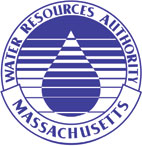JOINT PRESS RELEASE
 |
 |
Wendy Fox
(617) 626-1453
Ria Convery, Communications Director
MWRA
(617) 788-1105 or ria.convery@mwra.state.ma.us
DCR AND MWRA CLOSE QUABBIN RESERVOIR
TO PRIVATE RECREATIONAL BOATS FOR 45 DAYS
Measures to protect against invasive species will be reviewed
in wake of zebra mussels discovered in Berkshire lake
The Department of Conservation and Recreation (DCR) has closed the Quabbin Reservoir to all private recreational boats in the wake of last week’s discovery of invasive zebra mussels at a Berkshire County lake.
“We are taking this step in an excess of caution,” said DCR Commissioner Richard K. Sullivan Jr. “Zebra mussels have not been found in the Quabbin, and there is no known threat to the public water supply. However, closing the reservoir to outside boats for 45 days gives the state the opportunity to do more comprehensive testing for invasive pests and adjust our management plans to provide the utmost protection for public drinking water.”
As of this afternoon, to avoid any possibility that zebra mussels would be transferred into the Quabbin, private boats will be prohibited. To ensure recreational opportunities for the public, DCR will continue to offer its own fleet of rental boats during this 45-day period.
The MWRA board voted Wednesday afternoon to support DCR in closing the Reservoir to non-Quabbin boats.
"While the risk may be low, the Quabbin Reservoir is the drinking water supply for 2.5 million people,” said Frederick A. Laskey, MWRA executive director. “It's prudent to take every precaution."
Created in the 1930s as the municipal water system for the Greater Boston area, the Quabbin Reservoir holds 412 billion gallons of water and, through the Massachusetts Water Resources Authority (MWRA), the reservoir supplies water to more than 2.5 million people. Additionally, the reservoir is a popular boating and fishing area. Each year, about 9,000 boat launchings are recorded at the Quabbin.
With acidic water and low calcium levels, the Quabbin is not considered a suitable environment for zebra mussels. It is unlikely that a mussel would be able to grow its shell and thus, it would not survive. Juveniles could not grow, and adults could not reproduce successfully.
MWRA officials said there is no threat to drinking water from the Quabbin Reservoir from zebra mussels, and that the risk of such threats is low due to the water’s low calcium content. Nonetheless, board members agreed that to ensure the safety of the water system infrastructure and other valuable natural resources in the reservoir, and in recognition of other invasive plants such as milfoil that have been found in the Commonwealth, closing the Quabbin to outside boats was the most prudent course while a thorough assessment is conducted.
During the closing, DCR will employ dive teams to visually inspect and test the water and the MWRA infrastructure for zebra mussels, and will re-evaluate the appropriateness of non-Quabbin boats in the future. DCR and the MWRA will also evaluate and possibly adjust their management plans at the reservoir.
###
The Massachusetts Department of Conservation and Recreation (DCR), an agency of the Executive Office of Energy and Environmental Affairs, oversees 450,000 acres of parks and forests, beaches, bike trails, watersheds, and dams, in addition to 278 bridges and miles of roadways. Led by Commissioner Richard K. Sullivan Jr., the agency’s mission is to protect, promote, and enhance our common wealth of natural, cultural, and recreational resources. To learn more about DCR, our facilities, and our programs, please visit www.mass.gov/dcr. Contact us at mass.parks@state.ma.us.
COMMONWEALTH OF MASSACHUSETTS · EXECUTIVE OFFICE OF ENERGY & ENVIRONMENTAL AFFAIRS |
|||
| Department of Conservation and Recreation 251 Causeway Street, Suite 600 Boston MA 02114-2119 617-626-1250 617-626-1351 Fax www.mass.gov/dcr |
Deval L. Patrick Timothy P. Murray |
Ian A. Bowles, Secretary, Executive
|
|